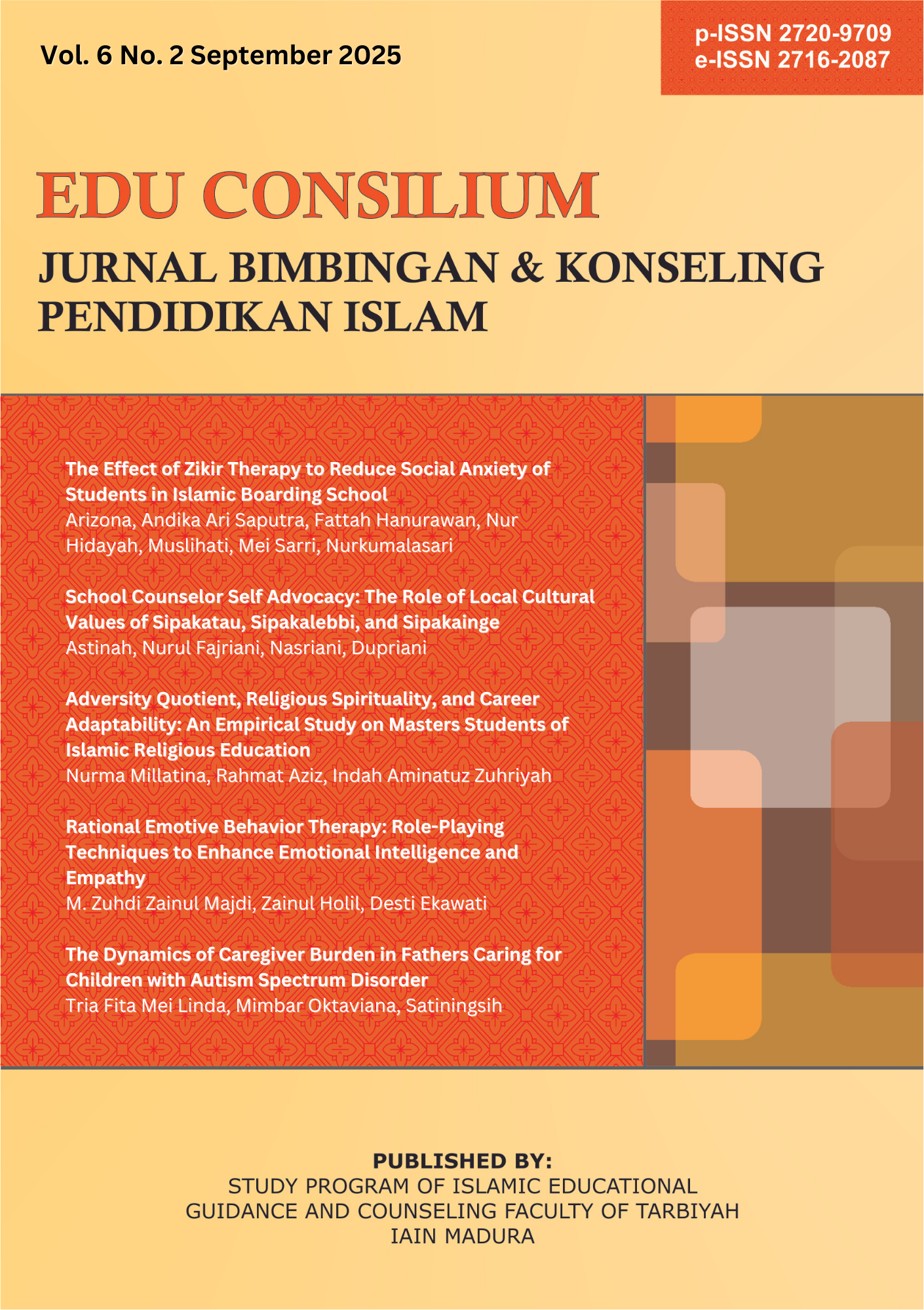Adversity Quotient, Religious Spirituality, and Career Adaptability: An Empirical Study on Masters Students of Islamic Religious Education
 Abstract views: 302
,
Abstract views: 302
,
 PDF downloads: 202
PDF downloads: 202
Abstract
This study aims to analyze the effect of Adversity Quotient (AQ) on Career Adaptability (CA) and to examine the role of Spiritual Religious (SR) as a moderating variable in this relationship. The scope of the research focuses on students of the Master of Islamic Education (MPAI) program at the State Islamic University (UIN) Maulana Malik Ibrahim Malang, who are facing academic challenges and preparing for careers in Islamic education. This research employed a quantitative explanatory approach. The sample consisted of 164 students selected using total sampling technique. The research instrument was a Likert-scale questionnaire that had been tested for validity and reliability. Data were analyzed using the Structural Equation Modeling–Partial Least Square(SEM-PLS) method via SmartPLS 4. The results showed that AQ had a positive and significant effect on CA (β = 0.683; p < 0.001). However, SR did not have a significant direct effect on CA (β = 0.066; p = 0.175), nor as a moderating variable (β = 0.070; p = 0.180). Simultaneously, AQ and SR explained 47.1% of the variance in CA. The study concludes that AQ is a key factor in shaping students' career adaptability, while SR serves more as a source of internal motivation rather than a statistically significant predictor. This research recommends strengthening students’ personal resilience through psychological and spiritual approaches within Islamic education.
Downloads
References
Adhiatma, A., Althof, S. V. F., & Triantiani, M. (2022). Islamic Human Values for Career Adaptability and Career Success of Millennial Generation. CISIS (Complex, Intelligent and Software Intensive Systems), 348–354. https://doi.org/10.1007/978-3-031-08812-4_33
Adriana, Anita, Sari, Y., & Warman. (2024). Dampak Perubahan Kebijkan Kurikulum 2013 ke Kurikulum Merdeka Belajar terhadap Guru dan Siswa. Jurnal Basicedu, 8(5), 4198–4209. https://journal.uii.ac.id/ajie/article/view/971
Al-Attas, S. M. N. (1999). The Concept of Education in Islam: A Framework for an Islamic Philosophy of Education. ISTAC.
Al-Ghazali. (2005a). Ihya Ulum al-Din. In Jilid IV. Dar al-Ma’arif.
Al-Ghazali. (2005b). Ihya Ulum al-Din. In Jilid I. Dar al-Ma’arif.
Ancok, D., & Suroso, F. N. (2018). Psikologi Islami: Solusi atas Problem-problem Psikologi (Edisi VIII). Pustaka Pelajar.
Arifin, M. R. (2025). Spiritualitas Kaum Urban (Menyoal Dampak Spiritualitas pada Kinerja Kaum Profesional Bank Syariah di Malaysia Indonesia dan Singapura) (S. Rosadi (ed.); Ke-1). CV. Gerbang Media Aksara.
Brown, S. D., & Lent, R. W. (2013). Career Development and Counseling Putting Theory and Reseacrh to Work. John Willey Sons, Inc.
Cahyawulan, W., & Wahyuni, E. (2021). Optimisme, Kepuasan Hidup dan Resiliensi terhadap Adaptabilitas Karier Remaja dari Kelas Sosio Ekonomi Bawah. Jurnal Penelitian Bimbingan Dan Konseling, 6(39–43).
Firdaus, N. R., & Muslihati, R. A. (2023). Hubungan antara Religiusitas dan Adversitas dengan Adaptabilitas Karier Siswa SMK. Buletin Konseling Inovatif, 3(2), 103–113. https://doi.org/10.17977/um059v3i22023p103-113
Fuad, A. J., & Amin, M. M. (2024). The Relationship of Adversity Quotient and Religious Culture on Students ’ Academic Achievement. Journal An-Nafs, 9(2), 252–266. https://doi.org/https://doi.org/10.33367/psi.v9i2.6063
Gumbira, A., Suroso, E., Suherli, I. R., & Mauluddin, G. G. (2025). Pengaruh Religiositas terhadap Kinerja Pegawai pada Inspektorat Daerah Kota Banjar. Ekonomica Sharia: Jurnal Pemikiran Dan Pengembangan Ekonomi Syariah, 10(2), 345–374.
Hair, J. F., Hult, G. T. M., Ringle, C. M., & Sarstedt, M. (2019). A Primer on Partial Least Squares Structural Equation Modeling (PLS-SEM) (Second Edi). Sage Publications.
Fallawarukka, A. M. I. (2024). Correlation between Religiosity and Adversity Quotient of Islamic Education Students of Universitas Muhammadiyah Yogyakarta. Journal of Islamic Education and Ethics, 2(1), 10–23. https://doi.org/10.18196/jiee.v2i1.18
Johan, B., Husnah, F. M., Puteri, A. D., Hartami, H., Rahmah, A. A., & Adnin, A. R. J. (2024). Tantangan dan Peluang Pendidikan Islam dalam Konteks Modern. Jurnal Pendidikan Islam, 1(4), 1–13. https://doi.org/10.47134/pjpi.v1i4.758
Katsir, I. (2000). Tafsir al-Qur’an al-’Azim. In Juz I. Dar al-Fikr.
Liana, L. (2009). Penggunaan MRA dengan SPSS untuk menguji pengaruh variabel moderating terhadap hubungan antara variabel independen dan variabel dependen. Dinamik: Jurnal Teknologi Informasi, 14(2), 90–97.
Lysne, C. J., & Wachholtz, A. B. (2011). Pain, spirituality, and meaning making: What can we learn from the literature? Religions, 2(1), 1–16. https://doi.org/10.3390/rel2010001
Maulida, G. R., & Ratnasari, D. (2024). Strategi Internalisasi Nilai-Nilai Karakter Religius Melalui Mata Kuliah Akidah Akhlak. Tadarus Tarbawy, 6(2), 210–227.
Muhaimin. (2001). Paradigma Pendidikan Islam: Upaya Menyemai Benih Peradaban. Remaja Rosdakarya.
Nurhasanah. (2022). Pengaruh Adversity Quotient dan Religiusitas terhadap Motivasi Penyelesaian Skripsi Mahasiswa PAI IAIN Metro Lampung. IAIN Metro Lampung.
Nurrokhmah, A. R., & Kuncoro, J. (2021). Hubungan antara Kecerdasan Spiritual dengan Adaptabilitas Karir pada Mahasiswa Universitas Islam Sultan Agung Semarang. PSISULA : Prosiding Berkala Psikologi, 244–253.
Pargament, K. I., Koenig, H. G., Tarakeshwar, N., & Hahn, J. (2004). Religious coping methods as predictors of psychological, physical and spiritual outcomes among medically ill elderly patients: A two-year longitudinal study. Journal of Health Psychology, 9(6), 713–730. https://doi.org/10.1177/1359105304045366
Primayanti, A. I. (2015). Strategi Pendidikan Islam Menghadapi Problematika Globalisasi. Al-Hikmah: Jurnal Agama Dan Ilmu Pengetahuan, 12(1), 46–60. https://doi.org/10.25299/jaip.2015.vol12(1).1447
RI, D. A. (2005). Al-Qur’an dan Terjemahannya. Lajnah Pentashihan Mushaf Al-Qur’an.
Salsabila, D., Desmita, Irman, & Sisrazeni. (2022). Hubungan Antara Adversity Quotient dan Career Adaptability Pada Mahasiswa Tingkat Akhir Prodi Psikologi Islam IAIN Batusangkar. JPI: Jurnal Psikologi Islam, 1(1), 1–10.
Savickas, M. L. (2013). Career Construction Theory and Practice. In In Career Development and Counseling: Putting Theory and Research to Work (2nd ed., pp. 147–183). John Wiley & sons, Inc.
Savickas, M. L., & Porfeli, E. J. (2012). Career Adapt-Abilities Scale: Construction, reliability, and measurement equivalence across 13 countries. Journal of Vocational Behavior, 80(3), 661–673. https://doi.org/https://doi.org/10.1016/j.jvb.2012.01.011
Sihombing, A. (2019). Spiritualitas Dalam Akademik. Jurnal Law Projustitia, IV(2), 42–63. http://www.seabs.ac.id/journal/oktober2002/Anugerah
Stoltz, P. G. (1997). Adversity Quotient: Turning Obstacles into Opportunities. John Wiley & Sons.
Stoltz, P. G. (2000). Adversity Quotient: Mengubah Hambatan Menjadi Peluang (Adversity Quotient: Turning Obstacles Into Opportunities), Penerjemah: T. Hermaya. PT Grasindo.
Thalib, A. bin A. (1993). Nahj al-Balaghah (S. Al-Shalih (ed.)). Dar al-Ma’arif.
Tian, Y., & Fan, X. (2014). Adversity quotients, environmental variables and career adaptability in student nurses. Journal of Vocational Behavior, 85(3), 251–257. https://doi.org/10.1016/j.jvb.2014.07.006
Triantiani, M., Fachrunnisa, O., & Adhiatma, A. (2022). Exploring Islamic Human Values on Self-Regulation for Career Adaptability among Muslim Millennials. E-Academia Journal, 11(1), 14–30.
Zohar, D., & Masrshall, I. (2001). Spiritual Intelligence: The Ultimate Intelligence. Bloomsbury Publishing.
The journal operates an Open Access policy under a Creative Commons Non-Commercial 4.0 International license. Authors who publish with this journal agree to the following terms:
- Authors retain copyright and grant the journal right of first publication with the work simultaneously licensed under a
 Commons Attribution-NonCommercial 4.0 International License
Commons Attribution-NonCommercial 4.0 International Licensethat allows others to share — copy and redistribute the material in any medium or format, and adapt — remix, transform, and build upon the material.
- Authors are able to enter into separate, additional contractual arrangements for the non-exclusive distribution of the journal's published version of the work (e.g., post it to an institutional repository or publish it in a book), with an acknowledgement of its initial publication in this journal.
- Authors are permitted and encouraged to post their work online (e.g., in institutional repositories or on their website) prior to and during the submission process, as it can lead to productive exchanges, as well as earlier and greater citation of published work (see The Effect of Open Access).




















